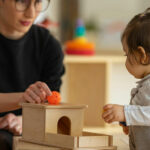Managing Illness with Small Children
Parents, you know that dreaded feeling when you hear a cough or sneeze followed by some crying in the middle of the night. Before you head over to check on your child, you begin to brace yourself for a few days of dealing with an illness. No, it isn’t a terrible life-threatening illness (thank goodness), but it is the fever with a cold, cough or flu that debilitates your life for the next three to five days. And just like that, out goes all the plans you made and out goes any commitments you have scheduled – now is the time to bunker down with your child and focus on getting them back to 100%.
Illness this time of year is inevitable. Especially when small children are still learning about proper hygiene and spend time together in close proximity. All we can do is prepare ourselves and reinforce good habits among your children and our students.
The beauty of a Montessori education is the importance placed on independence. What better way is there to foster an independent and encouraging environment than with self-care? These are foundational skills in Montessori pedagogy and that is established throughout all areas of the curriculum at MSK.
From an early age, together, we can establish good habits to prevent illness and the spread of germs. We aren’t doctors, let alone medical professionals, but we have the experience to know what works to keep germs out of the school and keep your kids healthy when illness occurs.
Below, you’ll find five helpful tips to help you and your family keep healthy.
- Personal Hygiene
Establishing good personal hygiene habits is the best way to keep germ-free. About 80% of communicable diseases are transferred by touch alone and this can be avoided by simply washing your hands.
With small children, there are many songs and Montessori activities to promote handwashing. In the Toddler and Casa program, we have different activities in the Practical Life curriculum as part of the work cycle. As children become older and more independent, they’ll carry these skills with them into the elementary program and beyond.
2. Discourage sleeve swipes
Children use their sleeves to wipe their noses because it’s quick, convenient and they can’t be bothered to go find a tissue. To be frank, this hygiene habit is just as important as properly cleaning up after using the washroom! We use tissue to clean ourselves there and we should use tissue elsewhere on our bodies when they need to be tidied up, too. We have tissue boxes throughout the classrooms so children can access them as needed. Let’s not go overboard and make our kids germaphobes, but a lesson on proper cough/sneeze care is always good to reinforce at school and home.
3. Increase Your Disinfecting Routine
This time of year, it is always handy to disinfect surfaces and household items more frequently. Things like doorknobs, toys and faucets should be sterilized often – if many hands touched it, it should be cleaned. Did you know that at MSK we hire a professional cleaning crew to come in and sterilize the school?
I like these products for home as they’re eco-friendly, cost effective and safe to be around small children:
- Honest Company Multi-Surface Cleaner
- Puracy Natural Baby Multi-Surface Cleaner
- Seventh Generation Multi-Surface Disinfecting Wipes
4. Stay Home Until You’re Feeling Better
This is pretty straightforward. Even if your child is fever-free but has a runny nose with coloured discharge or a cough that just won’t quit, please keep them home until they’re 100% better. Our sickness policy indicates this and we ask parents and guardians for their support here. Staying home will help children with illnesses regain their strength more quickly and keep the other kiddos germ-free too.
5. When in Doubt, Check with Your Doctor or Call Telehealth Ontario
At MSK we specialize in a premier Montessori education for children from toddler ages to grade seven (with grade eight beginning in September 2020, yippee!), we aren’t doctors or medical professionals. We follow guidelines set up by public health and use our common sense. If you ever have any questions about your child(ren)’s health, please contact your doctor or call Telehealth Ontario. And of course, in the event of an emergency call 9-1-1.









